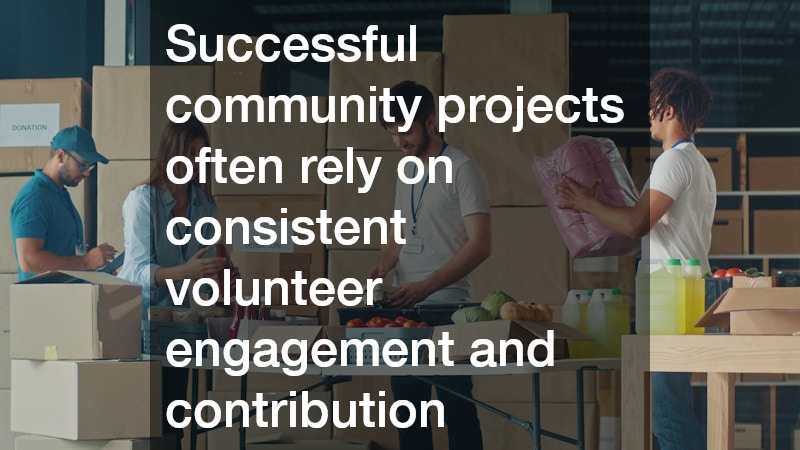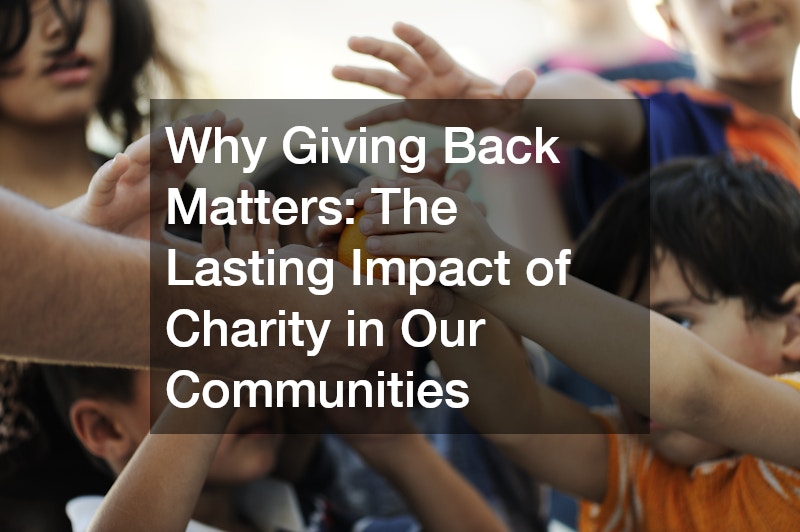Charity is an integral part of community development, providing a foundation for building stronger and more resilient societies. Its significance extends beyond mere financial aid, fostering a spirit of cooperation and empathy among community members. This article aims to uncover the reasons why giving back is crucial for the welfare and advancement of our communities.
How Does Charity Improve Community Well-being?
Charitable initiatives often play a vital role in boosting the economic stability of communities. These efforts can introduce new job opportunities, especially in underserved areas, by sponsoring local businesses and supporting entrepreneurial ventures. Moreover, nonprofit organizations frequently provide essential training and resources that empower individuals to gain necessary skills for the workforce.
By injecting funds into local economies, charity helps stimulate economic growth and development. This economic activity leads to improved infrastructure and public services, benefiting everyone in the community. Furthermore, charitable donations can directly support families in need, alleviating immediate financial pressures and contributing to a healthier economy in the long run.
Charity can also serve as a buffer against economic downturns, providing a safety net for those most affected by financial instability. During challenging times, community-driven efforts can ensure that basic needs are met, reducing the impact of economic hardships. This support helps stabilize the community as a whole, fostering an environment where all members have the opportunity to thrive.
Charitable work naturally brings people together, fostering a sense of unity and purpose within communities. When individuals collaborate to achieve common goals, they form stronger social connections and cultivate a sense of belonging. These strengthened bonds contribute to greater community spirit and a shared commitment to improving local conditions.
Participation in charity also provides opportunities for people from diverse backgrounds to interact and learn from one another. This increased social interaction helps break down barriers and build bridges between different community groups. As a result, communities often experience enhanced social cohesion and a reduction in tensions that may arise from misunderstanding or prejudice.
What Are the Long-term Effects of Charitable Actions?
Sustained charitable efforts are crucial for the long-term success and sustainability of community projects. Regular funding and support enable initiatives to thrive, ensuring they can adapt and meet evolving needs. This continued assistance allows projects to have a lasting impact, significantly improving the standard of living within communities.
Successful community projects often rely on consistent volunteer engagement and contribution. These efforts provide a steady flow of resources and manpower, enabling projects to overcome obstacles and continue operating efficiently. As a result, communities benefit from enduring improvements in areas such as education, health, and infrastructure.
Long-term success is also contingent on creating strategies that focus on self-sufficiency and sustainability. By empowering communities to take ownership of projects, charitable efforts can ensure that positive changes are maintained beyond the initial implementation. This approach fosters resilience, as community members develop the skills and knowledge needed to sustain projects independently.
The influence of charitable actions often extends to future generations, inspiring them to continue the cycle of giving and community involvement. When young people witness the positive impact of charity, they are more likely to embrace similar values and prioritize charitable involvement in their lives. This intergenerational transmission of philanthropy ensures that communities remain engaged and committed to helping others.
Charitable activities provide valuable lessons about empathy, compassion, and responsibility. These values, imparted to younger generations, contribute to the development of socially conscious individuals who are prepared to address community challenges. As these individuals mature, they often take on leadership roles, championing initiatives that further community development and progress.
Why Is It Important for Individuals to Engage in Charity?
Engaging in charity provides individuals with a profound sense of fulfillment and purpose. Participating in meaningful activities that contribute to the greater good enhances one’s sense of accomplishment and satisfaction. This fulfillment stems from knowing that one’s efforts are making a tangible difference in the lives of others and the community as a whole.
Charity work offers an opportunity for individuals to align their actions with their values and passions. By dedicating time and energy to causes they care about, people can find deeper purpose and meaning in their lives. This alignment often leads to increased motivation and enthusiasm, as individuals become more committed to their chosen causes.
Moreover, engaging in charity can help individuals develop a greater understanding of the challenges faced by others. This empathy fosters personal growth and encourages a more compassionate perspective, enriching one’s relationships and interactions. In turn, this heightened sense of purpose and empathy can lead to a more fulfilling and rewarding life.
Individual involvement in charity has the potential to create a ripple effect, fostering a culture of generosity and empathy within communities. When people witness acts of kindness and support, they are often inspired to contribute in their own ways, amplifying the impact of charitable efforts. This widespread participation cultivates an environment where generosity and kindness are valued and encouraged.
As individuals engage in charity, they set an example for others, demonstrating the positive effects of giving back. These actions can inspire friends, family, and colleagues to get involved, further strengthening the culture of generosity. Over time, this collective commitment to charitable engagement leads to more compassionate and connected communities.
Giving back through charity is essential for building healthier, more resilient communities. By enhancing economic stability, fostering social connections, and facilitating personal development, charitable actions create lasting positive change. Whether through individual involvement or community-wide initiatives, embracing a culture of generosity and empathy strengthens the social fabric and ensures a brighter future for all. It is imperative for individuals to get involved in charity, not only for the betterment of their communities but also for their personal growth and fulfillment.



